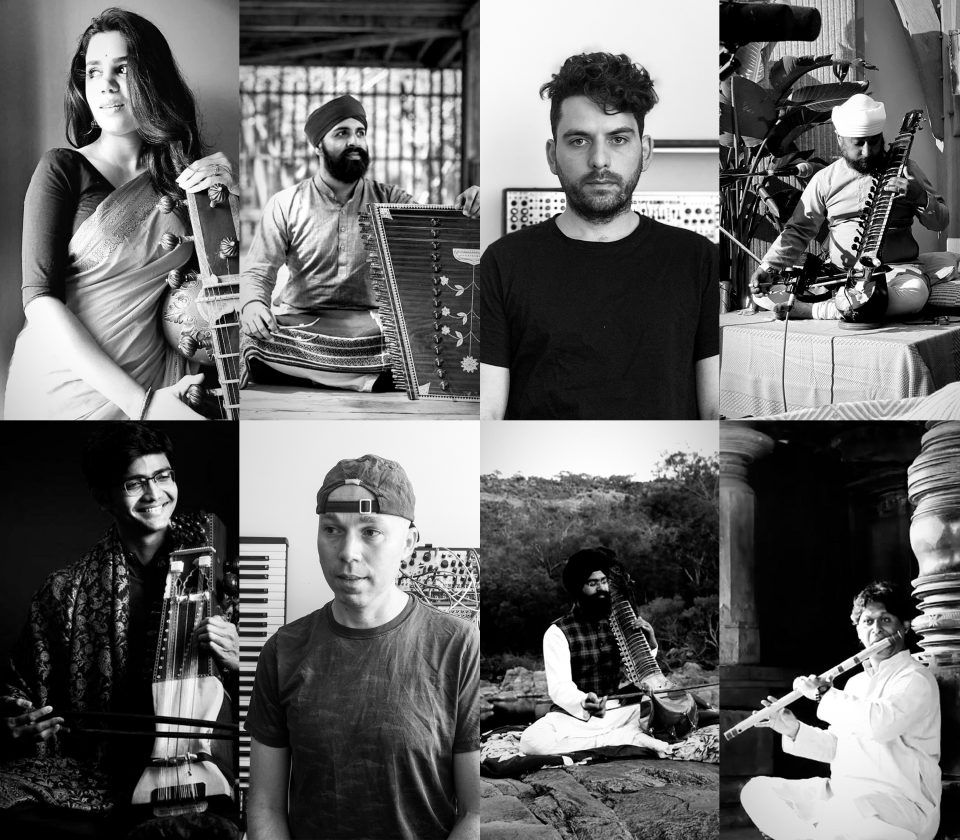Producers Ryan J. Raffa and Nico Rosenberg Create Profound Ambient Record ‘Velā’ with The Svara Ensemble
Mental wellbeing, cultural connection and spiritual journeying come together on the six-track project, which brings together artists from India, U.K., Chile and Taiwan

Artists involved in 'Velā': (top row, left to right) Kalyani Deshpande, Kaviraj Singh, Nico Rosenberg, Gurbaksh Singh Matharu; (bottom row, left to right) Vanraj Shastri, Ryan J. Raffa, Siripal Singh and Sameer Rao. Photos: Courtesy of the Svara Ensemble
When people asked U.K.-based Raju Mema what kind of music he liked listening to, he had a peculiarly abstract answer. “I’d just say ‘vibration sounds’ or something like that,” he says with a laugh.
It wasn’t until he heard Berlin-based Chilean producer-violinist Nico Rosenberg’s music—which he found on Instagram—that Mema realized a more widely tagged label for it was ambient music. Deeply interested in the meditative and healing aspects of sound as well as Indian classical music, Mema launched the Svara Ensemble and brought in Rosenberg, Taiwan-based producer Ryan J. Raffa and other Indian artists to deliver a poignant record called Velā.
The Svara Ensemble for the six tracks released featured U.K. artists like santoor player Kaviraj Singh, dilruba/esraj artist Gurbaksh Singh Matharu, Mumbai/Ahmedabad sarangi artist Vanraj Shastri, Siripal Singh (also performing dilruba), flautist Sameer Rao and sitarist Kalyani Deshpande. Done entirely remotely, the producers were also coming in with their own appreciation for Indian classical music.
Raffa, who has run workshops and taught in Mumbai, says, “I discovered Indian classical music through American folk and electronic musicians, like John Fahey or Terry Riley. So this connection between Indian classical music, American folk music, and electronic music is something that’s intertwined in how I developed as an artist.” Rosenberg, for his part, counts legends like Hariprasad Chaurasia, Shivkumar Sharma and Lakshminarayana Shankar as impactful.
Rosenberg adds he was still amazed at the offer put forward by Mema to work on Velā. “I was in the south of Chile and I saw that someone wrote to me from the U.K. to develop a musical project that I always wanted to do: to apply everything I learnt from Hindustani in a musical album. I never thought it would happen but it did and it was beautiful.”
Contributing artists Matharu (who features on “Taraka”), Shastri (“Kuvalaya”) and Deshpande (“Velā”) all agree that they are drawn to the meditative quality of music. Deshpande adds, “The period in which this project began was so troubling on both the personal and global scale because of the pandemic. It’s my feeling this kind of musical collaboration is what we need at this time.”
Raffa says that when they began to receive tracks from the artists, he “would literally weep deep sobs of joy.” He adds, “It was just so deeply moving.” The music was born out of improvisations on classical instruments, sent to Rosenberg to “embellish, stretch or completely reimagine” and then handed to Raffa. “I would add my own interpretations to these collections of sounds with synthesizers and modular synths and then finally mix it together into a cohesive whole,” he adds.
The outstanding album calmly shape-shifts between the lines of classical-informed phrases and swelling synth lines and string arrangements, making for an engrossing listening experience. Matharu says, “While creating music for Velā, I was conscious that it should be slower in tempo and allow for some space. Spacious enough to give the listener an opportunity to slow down in the hope that it leads to a spiritual, healing experience.”
While Velā is a realization of musical ideas that have been finessed over the span of a year and a half, Mema says there are visuals in store from the album cover artist Nicolas Amaro. As for the future, the Svara Ensemble will continue to bring in more musicians for different projects. Mema says, “We’re currently working with Ustaad Dildar Hussain (tabla player for the legendary Nusrat Fateh Ali Khan) and his son Israr Hussain to explore some Sufi and electronic sounds which are very much in the experimental phase, but that’s where the magic really happens—in the experimenting.”
Listen to Velā below. Stream/buy via Shimmering Moods Records here.



